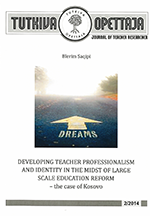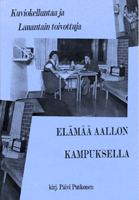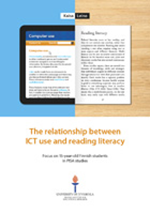Developing teacher professionalism and identity in the midst of large scale education reform
1,00 €
The case of Kosovo
Saqipi, Blerim
978-952-5066-73-9; 1238-4631
Tuope.
Journal of Teacher Researcher / Tutkiva opettaja (2)
2014
Kun halutaan kehittää opettajien ammatillisuutta, pitäisi ottaa huomioon maan historiallinen ja kulttuurinen tausta. Tähän tulokseen on tullut Blerim Saqipi, joka tutki väitöskirjassaan opettajien ammatillisuuden ja identiteetin kehittymistä uudessa, kehittyvässä valtiossa, Kosovossa.
Väitöskirjan mukaan kansainvälisistä käytänteistä ja malleista voidaan saada arvokasta apua, mutta niiden käyttöönottoa pitää huolella harkita ja ottaa paikalliset olosuhteet huomioon.
Väittelijä ehdottaa koulujen muutosjohtamisen tueksi Vygotskyn lähikehitysvyöhykkeen (ZPD) teoriaa. Se edellyttää opettajan ammatillisen kehittymisen luonteen ja tarkoituksen käsitteellistämistä uudelleen, niin että koulutuspolitiikan tavoitteet toteutuvat koulun käytänteissä ja opettajat ymmärtävät omaa käyttöteoriaansa. Prosessin tavoitteena pitäisi olla laajennettu lähikehitysvyöhyke, jossa opettajien ammatillisuutta kuvaa reflektiivinen kollegiaalisuus ja koulujen toimiminen oppivina organisaatioina.
Abstract
This dissertation analyzes the development of teacher professionalism and identity in situations of developing countries involved in educational transformation in their attempt to follow the best practices and international trends. Using Kosovo education system as a case - a new country in Europe, a developing democracy and aspiring integration processes in the European Union and wider - this dissertation suggests that the framework for analyzing teacher policy environment should be seen as multidimensional and dynamic in view of increasing demands for teacher professionalism, the evolving education context, and broader historical and cultural background.
The dissertation suggests that the uniform models of developing teacher professionalism - though global practices and trends can provide valuable development input - should yet be considered with care by adopting the ‘what works here' approach to education policy making. Thus, developing education systems need to manage external influences and lessons learnt (which derive as a result of interaction with global practices and standards) by exposing them to the local context and transformation processes.
The study suggests a model of change management by introducing a Zone of Proximal Development as a transformation zone which implies the need to reconceptualise the nature and purpose of teacher professional development as a tool to facilitate translation of education policy into school practice and helping teachers understand their personal practical theory. The transformation processes should lead into an extended zone of proximal development - the desired target - whereby teacher professionalism is characterized as reflective collegiality and schools function as learning organizations.
1 varastossa





